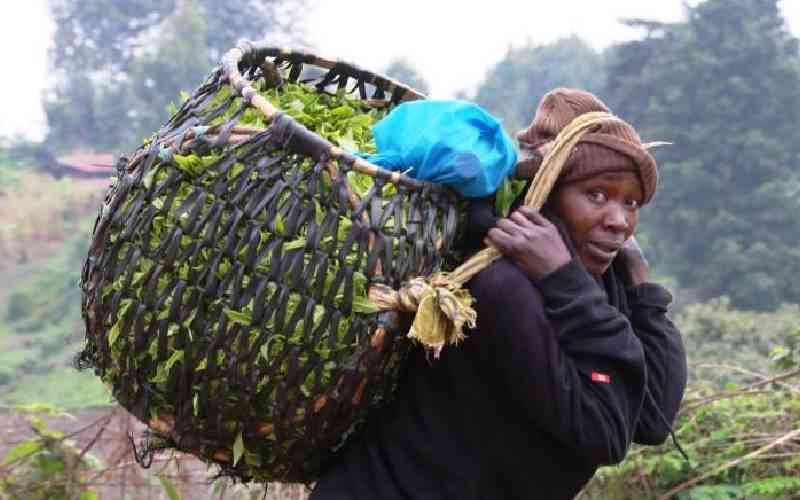The Kenya Tea Development Agency (KTDA) has attributed this year’s reduced second bonus payment to tough international market conditions and unfavorable currency exchange rates.
The authority in a statement on Tuesday said the drop in earnings was beyond the control of farmers and factories.
According to the statement, while international tea prices remained relatively stable, the strengthening of the Kenya Shilling against the US dollar significantly eroded revenues.
“In 2024, the Kenya Shilling traded at an average of Sh144 to the US dollar, while in 2025 the average was Sh129,” the agency said, adding, “This weaker exchange rate meant that even where international prices were stable, the amount realised in Kenya Shillings was significantly lower.”
Follow The Standard
channel
on WhatsApp
The lower returns have been felt across all regions, with tea-growing areas both east and west of the Rift Valley recording drops in made tea prices compared to last year.
For instance, farmers in Murang’a earned Sh376 per kilo of made tea, down by Sh42, while their counterparts in Kericho earned Sh245, a drop of Sh101.
Similar declines were recorded in Nyeri (down Sh42), Embu (down Sh34), and Kisii (down Sh95).
But KTDA said the differences in second payments between regions were not due to mismanagement but rather natural market variations.
“Teas from certain high-altitude zones naturally fetch better prices because of quality attributes favored in global markets,” the statement read.
“Independent producers and plantation companies in the West of Rift, outside KTDA, have reported similar difficulties, confirming that these disparities are market-driven and not unique to KTDA-managed factories.”
The agency urged stakeholders to avoid politicising the issue, warning that dragging factory operations into politics would only hurt farmers.
“The surest way to safeguard incomes is through maintaining high quality green leaf, disciplined factory management, and adherence to good agricultural practices,” KTDA emphasised.
Despite the current challenges, KTDA said it is working on long-term measures to stabilize farmer incomes. These include diversifying into orthodox teas, which attract higher prices in niche markets, expanding value addition, and reducing packaging costs.
The agency is also collaborating with the government to open new export markets, including China, and investing in modern factory technologies and alternative energy solutions to cut costs.
“While understandably disappointing to many, this year’s final is a direct reflection of global trading conditions beyond KTDA’s control,” the agency said.
“We assure our tea farmers that KTDA remains committed to their welfare and to ensuring the long-term sustainability of the sector. The challenges we face are global and systemic, but by focusing on quality, efficiency, and innovation together, we will overcome them and secure better earnings in the future,” read part of the statement.
The second payment, which is eagerly awaited each year, remains a key source of income for more than 600,000 smallholder tea farmers across the country.
Follow The Standard
channel
on WhatsApp
The Kenya Tea Development Agency (KTDA) has attributed this year’s reduced second bonus payment to tough international market conditions and unfavorable currency exchange rates.
The authority in a statement on Tuesday said the drop in earnings was beyond the control of farmers and factories.
According to the statement, while international tea prices remained relatively stable, the strengthening of the Kenya Shilling against the US dollar significantly eroded revenues.
“In 2024, the Kenya Shilling traded at an average of Sh144 to the US dollar, while in 2025 the average was Sh129,” the agency said, adding, “This weaker exchange rate meant that even where international prices were stable, the amount realised in Kenya Shillings was significantly lower.”
Follow The Standard
channel
on WhatsApp
The lower returns have been felt across all regions,
with tea-growing areas both east
and west of the Rift Valley recording drops in made tea prices compared to last year.
For instance, farmers in Murang’a earned Sh376 per kilo of made tea, down by Sh42, while their counterparts in Kericho earned Sh245, a drop of Sh101.
Similar declines were recorded in Nyeri (down Sh42), Embu (down Sh34), and Kisii (down Sh95).
But KTDA said the differences in second payments between regions were not due to mismanagement but rather natural market variations.
“Teas from certain high-altitude zones naturally fetch better prices because of quality attributes favored in global markets,” the statement read.
“Independent producers and plantation companies in the West of Rift, outside KTDA, have reported similar difficulties, confirming that these disparities are market-driven and not unique to KTDA-managed factories.”
The agency urged stakeholders to avoid politicising the issue, warning that dragging factory operations into politics would only hurt farmers.
“The surest way to safeguard incomes is through maintaining high quality green leaf, disciplined factory management, and adherence to good agricultural practices,” KTDA emphasised.
Despite the current challenges
, KTDA said it is working on long-term measures to stabilize farmer incomes. These include diversifying into orthodox teas, which attract higher prices in niche markets, expanding value addition, and reducing packaging costs.
The agency is also collaborating with the government to open new export markets, including China, and investing in modern factory technologies and alternative energy solutions to cut costs.
“While understandably disappointing to many, this year’s final is a direct reflection of global trading conditions beyond KTDA’s control,” the agency said.
Stay informed. Subscribe to our newsletter
“We assure our tea farmers that KTDA remains committed to their welfare and to ensuring the long-term sustainability of the sector. The challenges we face are global and systemic, but by focusing on quality, efficiency, and innovation together, we will overcome them and secure better earnings in the future,” read part of the statement.
The second payment, which is eagerly awaited each year, remains a key source of income for more than 600,000 smallholder tea farmers across the country.
Follow The Standard
channel
on WhatsApp
By Beverly Nyaboke


